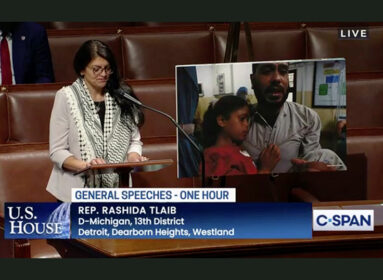
Connecticut’s senior U.S. Senator calls for “careful and close” review of Iran deal
By Judie Jacobson
“I welcome the announcement of an agreement with Iran after a long and difficult diplomatic road, but the terms now must be carefully and closely reviewed by Congress with the paramount goal of preventing a nuclear-armed Iran. This agreement must be airtight, comprehensive and enduring – and, perhaps most importantly, strictly verifiable and enforceable. While our common hope may be that diplomacy has succeeded in barring an Iranian path to nuclear weapons capability, Congress must apply exacting standards and strict scrutiny, especially given Iran’s history of deceit and international law violations.”
That was the statement released on Tuesday, July 14, by U.S. Senator Richard Blumenthal, in response to the announcement by the White House of a nuclear agreement with Iran.
Elected in November 2011 and currently serving his first term as Senator, Blumenthal is the ranking member on the Senate’s Committee on Veterans’ Affairs, and also serves on the Armed Services, Judiciary and Commerce, Science and Transportation Committees.
The Ledger spoke with Connecticut’s senior senator several days after he released his initial statement to find out more about what has come to be known as the ‘Iran Deal.’
Q: Have you had a chance to read the agreement as of yet?
A: I’ve read it and some of the annexes and I’m going to continue to review some of the agreement text very closely. I’m also going to consult with experts, advocates on both sides, and people throughout the state, in an effort to apply exacting standards and strict scrutiny, as all of my colleagues will hopefully do as well.
Q: Ron Dermer, the Israeli Ambassador to Washington, wrote an op-ed in the Washington Post this week in which he pinpointed what he called “four problem areas” within the deal…
A: You know, with all due respect to the Ambassador, I’m not going to engage in a point-by-point discussion of his op-ed or anyone else’s statement for that matter. Every member of the Senate has to really decide for him or herself and I will be doing that decision-making independent of any single individual, although I’ll be talking to experts and administration officials, members of organizations that reflect various points of view.
Q: There was a report today that Samantha Power, the U.S. Ambassador to the UN, is circulating a draft resolution on the UN Security Council to endorse the deal. Does that usurp the role of Congress, which has been given 60 days to review the deal? (Note: Since posing that question, the UN Security Council voted on July 20, to approve this resolution)
A: The UN resolution when it’s passed in no way substitutes for an act of Congress, which is necessary to lift sanctions. A UN resolution is not binding on the Congress and it should not usurp the role of Congress. Congress continues to have an independent, serious responsibility to exercise close scrutiny and review. That congressional action is necessary to lift sanctions, which is a condition of the deal, and it’s also necessary for the agreement to be legally binding. So, I regret that this has gone to the Security Council already — I think it’s unfortunate — but in no way does it detract from the responsibility we have as members of Congress.
Q: Regarding the four American hostages being held in Iran, Nancy Pelosi was asked whether or not their release should have been as a precondition to any deal. She said ‘no.’ Do you agree?
A: I will continue to work diligently and urgently for the release of those hostages and I believe that we should continue to seek their release. But I’m going to focus on the merits of this agreement and assess whether it stops a nuclear-armed Iran. The paramount, preeminent goal is to stop a nuclear-armed Iran which would be a dire and direct threat to our national security interests and would endanger as well our allies in the Middle East.
Q: There is widespread concern that the lifting of sanctions will free up an estimated $150 billion that Iran, as the world’s leading exporter of terrorism, would then use to fund groups like Hezbollah and Hamas.
A: I hear that concern. It’s a consequence of the agreement and the lifting of sanctions is certainly a factor that needs to be assessed. But independent of this agreement, the United States needs to continue its fight against extremism and terrorism, most especially state-sponsored violence, which Iran has been responsible for supporting. One of the reasons that there is a need to be particularly vigilant and vigorous in terms of this agreement is Iran’s history of supporting terrorism, as well as its record of deceit and international law violation. There is ‘trust and verify’ – but this has to be ‘verify and verify.’ So, we must continue to persevere and persist in our against terrorism that threaten Israel and our other allies.
Q: Are there any specific elements of the deal that especially concern you? What will you be looking for – or looking out for – as you review the deal?
A: My judgment will be made on the merits of this agreement; whether it is air tight, comprehensive, long-lasting and, perhaps most important, verifiable and enforceable. I am very concerned about the conditions for access to military facilities; I’m very concerned with the obstacles that could be placed in the way of such access; I’m very concerned about procedures and practicability of re-imposing sanctions if there is a violation – the so-called ‘snap-back’ provisions. I’m very focused on the number of centrifuges and the amount of enriched uranium. There are really serious substantive issues here and I’m going to make judgments about those issues in our national security interests as we have hearings before the armed services committee, and as I consult with experts and others throughout the state of Connecticut and the country.
Q: Can you give me some examples of those you might consult in making your assessment?
A: Well there are some obvious and some not-so-obvious members of the internatinoal community whose views might be helpful and informative. And, of course, my door is always open to the people in Connecticut who may have views on the subject.
Q: Have you heard from constituents?
A: Very definitely. And I have had meetings with them; in fact, as we speak I’m about to sit down with one of the leaders of our Jewish community in the state of Connecticut, though I prefer not to talk about individuals.
I regard this decision as one of the most consequential that I will make as a member of the United States Senate and I’m going to give it the care and caution and very urgent scrutiny that it deserves.







 Southern New England Jewish Ledger
Southern New England Jewish Ledger














